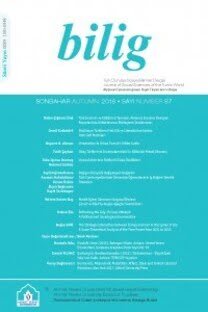A qualitative inquiry from the aegean region: Changing ruling classin business circles
___
Abercrombie, Nicholas and B. S. Turner (1978). The Dominant Ideology The- sis. The British Journal of Sociology29 (2): 149 - 170.Aron, Raymond (1950). Social Structure and the Ruling Class: Part 1. The British Journal of Sociology1 (1): 1 - 16.
_____, (1950). Social Structure and the Ruling Class: Part 2. The British Journal of Sociology1 (2): 126-143.
Aycan, Zeynep (2004). Key Success Factors for Women in Management in Turkey. International Association for Applied Psychology. Published by Blackwell Publishing.
Block, Fred (1977). The Marxist Theory of the State. Socialist Revolution 33: 6-28.
Bulut, Osman (2012). Osmanlı Ekonomi Politiğine Yeniden Bir Bakış. bilig 62: 63 -96.
Domhoff, William G. (1999). State and Ruling Class in Corporate America. Critical Sociology25: 266- 277.
Ger, Güliz (2009). Tüketici Araştırmalarında Nitel Yöntemler Kullanmanın İncelikleri ve Zorlukları. Tüketici ve Tüketim Araştırmaları Dergisi, 1 (1): 1 -19.
Giddens, Anthony (1987). Social Theory and Modern Sociology. Polity Press: Cambridge, in association with Basil Blackwell.
Goldthorpe, John H (1968). The Affluent Worker in the Class Structure . Ca m- bridge: Cambridge University Press.
Heper, Metin (2000). The Ottoman Legacy and Turkish Politics. Journal of International Affairs 54 (1): 63 - 82.
İnalcık, Halil (1964). The Nature of Traditional Society: Turkey. Political Modernization in Japan and Turkey. Princeton University Press.
Kongar, Emre (1998). 21. Yüzyılda Türkiye . Remzi Kitabevi.
Lorasdağı, Berrin Koyuncu (2010). The Relationship Between Islam and Globa l- ization in Turkey in the Post-1990 Period: The C ase of MÜSİAD. bilig 52: 105 -128.
Marx, Karl (1968). The Eighteenth Brumaire of Louis Bonaparte. Karl Marx and Friedrich Engels, Selected Works. London: Lawrence and Wishart.
Marx, Karl and Friedrich Engels (1979). The German Ideology. London: Lawrence and Wishart.
Miliband, Ralph (1969). State in Capitalist Society. Weidenfeld & Nicolson. London.
Pareto, Vilfredo (1935). The Mind and The Society. Harcourt: Brace.
Poulantzas, Nicos (1973). Political Power and Social Classes. NLB: And Sheed and Ward.
_____, (1975). Classes in Contemporary Capitalism. London: NLB.
Spiggle, Susan (1994). Analysis and Interpre tation of Qualitative Data in Consumer Research. Journal of Consumer Research 21: 491 -503.
Weber, Marx (1979). Economy and Society: An Outline of Interpretive Sociology. Berkeley: University of California Press.
Wright, Erik Olin (1978). Class,Crisis and the State . London: New Left Books.
_____, (1985). Classes. London: Verso.
_____, (2000). Class Counts: Student Edition. NY: Cambridge University Press.
- ISSN: 1301-0549
- Yayın Aralığı: 4
- Başlangıç: 1996
- Yayıncı: Ahmet Yesevi Üniversitesi Mütevelli Heyet Başkanlığı
Özbekistan'da merkez - yerel ilişkisi: Taşkent mahalleleri üzerine bir deneme
Hikâyede Tip sorunsalı ve Sabahattin Ali'nin Kamyon'u
Kutadgu Bilig'deki sanı Edatı Üzerine
Osman Gümüşçü (2010). Tarihi Coğrafya. İstanbul: Yeditepe Yayınevi
A qualitative inquiry from the aegean region: Changing ruling classin business circles
Xi'an Yazıtı Üzerinde Yeni Okuma ve Anlamlandırmalar
Azerbaycan'da Petrol Dışı Vergi Sisteminin Gelişimi ve Reform Önerileri
Avusturya'da Yaşayan Türklerin Türkiye ile Bağları ve Evlilik Göçü
